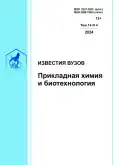Influence of Rhodococcus qingshengii VKM Ac-2784D biostimulator on bacterial isolates from potato endo- and rhizosphere
- Authors: Morits A.S.1, Markova Y.A.1, Filinova N.V.1, Petrushin I.S.1
-
Affiliations:
- Siberian Institute of Plant Physiology and Biochemistry SB RAS
- Issue: Vol 14, No 4 (2024)
- Pages: 578-585
- Section: Physico-chemical biology
- URL: https://ogarev-online.ru/2227-2925/article/view/302282
- DOI: https://doi.org/10.21285/achb.942
- EDN: https://elibrary.ru/TIVSPZ
- ID: 302282
Cite item
Full Text
Abstract
Keywords
About the authors
A. S. Morits
Siberian Institute of Plant Physiology and Biochemistry SB RAS
Email: aconitkaaco@gmail.com
Yu. A. Markova
Siberian Institute of Plant Physiology and Biochemistry SB RAS
Email: juliam06@mail.ru
N. V. Filinova
Siberian Institute of Plant Physiology and Biochemistry SB RAS
Email: filinova_nv@mail.ru
I. S. Petrushin
Siberian Institute of Plant Physiology and Biochemistry SB RAS
Email: ivan.kiel@gmail.com
References
- Petrushin I.S., Filinova N. V., Gutnik D.I. Potato microbiome: relationship with environmental factors and approaches for microbiome modulation. International Journal of Molecular Sciences. 2024;25(2):750. doi: 10.3390/ijms25020750.
- Petrushin I.S., Vasilev I.A., Markova Yu.A. Drought tolerance of legumes: physiology and the role of the microbiome. Current Issues in Molecular Biology. 2023;45(8):6311-6324. doi: 10.3390/cimb45080398.
- Yarullina L.G., Burkhanova G.F., Tsvetkov V.O., Cherepanova E.A., Zaikina E.A., Sorokan A.V., et al. Stimulation of the protective mechanisms of Solanum tuberosum by the bacteria Bacillus subtilis and chitooligosaccharides upon infection with Phytophthora infestans. Applied Biochemistry and Microbiology. 2022;58:166-174. doi: 10.1134/S0003683822020168.
- Padilla-Gálvez N., Luengo-Uribe P., Mancilla S., Maurin A., Torres C., Ruiz P., et al. Antagonistic activity of endophytic actinobacteria from native potatoes (Solanum tuberosum subsp. tuberosum L.) against Pectobacterium carotovorum subsp. carotovorum and Pectobacterium atrosepticum. BMC Microbiology. 2021;21:335. doi: 10.1186/s12866-021-02393-x.
- Cappelletti M., Presentato A., Piacenza E., Firrincieli A., Turner R.J., Zannoni D. Biotechnology of Rhodococcus for the production of valuable compounds. Applied Microbiology and Biotechnology. 2020;104:8567-8594. doi: 10.1007/s00253-020-10861-z.
- Ivshina I., Bazhutin G., Tyumina E. Rhodococcus strains as a good biotool for neutralizing pharmaceutical pollutants and obtaining therapeutically valuable products: through the past into the future. Frontiers in Microbiology. 2022;13:967127. doi: 10.3389/fmicb.2022.967127.
- Krivoruchko A., Kuyukina M., Peshkur T., Cunningham C.J., Ivshina I. Rhodococcus strains from the specialized collection of alkanotrophs for biodegradation of aromatic compounds. Molecules. 2023;28(5):2393. doi: 10.3390/molecules28052393.
- Tretyakova M.S., Ivanova M.V., Belovezhets L.A., Markova Yu.A. Possible use of oil-degrading microorganisms for protection of plants growing under conditions of oil pollution. IOP Conference Series: Earth and Environmental Science. 2019;315:072046. doi: 10.1088/1755-1315/315/7/072046.
- Markova Yu.A., Petrushin I.S., Belovezhets L.A. Detection of gene clusters for biodegradation of alkanes and aromatic compounds in the Rhodococcus qingshengii VKM Ac-2784D genome. Vavilov Journal of Genetics and Breeding. 2023;27(3):276-282. doi: 10.18699/VJGB-23-33.
- Helfrich E.J.N., Vogel C.M., Ueoka R., Schäfer M., Ryffe F., Müller D.B., et al. Bipartite interactions, antibiotic production and biosynthetic potential of the Arabidopsis leaf microbiome. Nature Microbiology. 2018;3:909-919. doi: 10.1038/s41564-018-0200-0.
- Scherlach K., Hertweck C. Mining and unearthing hidden biosynthetic potential. Nature Communications. 2021;12:3864. doi: 10.1038/s41467-021-24133-5.
- Chen W., Zuo Y., Hou Z., Wang B., Xiong S., Ding X., et al. Effect of Rhodococcus bioaugmentation and biostimulation on dibenzothiophene biodegradation and bacterial community interaction in petroleum-contaminated soils. Frontiers in Environmental Science. 2023;11:1270599. doi: 10.3389/fenvs.2023.1270599.
- Petrushin I.S., Markova Y.A., Karepova M.S., Zaytseva Y.V., Belovezhets L.A. Complete genome sequence of Rhodococcus qingshengii strain VKM Ac-2784D, isolated from Elytrigia repens rhizosphere. Microbiology Resource Announcements. 2021;10(11). doi: 10.1128/mra.00107-21.
- Graskova I.A., Romanenko A.S., Vladimirova S.V., Kolesnichenko A.V. Changes in peroxidase activity during potato ring rot infection. Russian Journal of Plant Physiology. 2004;51:476-479. doi: 10.1023/B:RUPP.0000035739.81684.11.
- Blin K., Shaw S., Augustijn H.E., Reitz Z.L., Biermann F., Alanjary M., et al. AntiSMASH 7.0: new and improved predictions for detection, regulation, chemical structures and visualisation. Nucleic Acids Research. 2023;51(W1):W46-W50. doi: 10.1093/nar/gkad344.
- Undabarrena A., Valencia R., Cumsille A., Zamora-Leiva L., Castro-Nallar E., Barona-Gomez F., et al. Rhodococcus comparative genomics reveals a phylogenomicdependent non-ribosomal peptide synthetase distribution: insights into biosynthetic gene cluster connection to an orphan metabolite. Microbial Genomics. 2021;7(7):000621. doi: 10.1099/mgen.0.000621.
- Czech L., Hermann L., Stöveken N., Richter A.A., Höppner A., Smits S.H.J., et al. Role of the extremolytes ectoine and hydroxyectoine as stress protectants and nutrients: genetics, phylogenomics, biochemistry, and structural analysis. Genes. 2018;9(4):177. doi: 10.3390/genes9040177.
- Chen Y., Xie B., Yang J., Chen J., Sun Z. Identification of microbial carotenoids and isoprenoid quinones from Rhodococcus sp. B7740 and its stability in the presence of iron in model gastric conditions. Food Chemistry. 2018;240:204-211. doi: 10.1016/j.foodchem.2017.06.067.
- Jiang W., Sun J., Gao H., Tang Y., Wang C., Jiang Y., et al. Carotenoids production and genome analysis of a novel carotenoid producing Rhodococcus aetherivorans N1. Enzyme and Microbial Technology. 2023;164:110190. doi: 10.1016/j.enzmictec.2022.110190.
- O’Brien S., Culbert C.T., Barraclough T.G. Community composition drives siderophore dynamics in multispecies bacterial communities. BMC Ecology and Evolution. 2023;23:45. doi: 10.1186/s12862-023-02152-8.
- Nazari M.T., Simon V., Machado B.S., Crestani L., Marchezi G., Concolato G., et al. Rhodococcus: a promising genus of actinomycetes for the bioremediation of organic and inorganic contaminants. Journal of Environmental Management. 2022;323:116220. doi: 10.1016/j.jenvman.2022.116220.
- Ivshina I.B., Kuyukina M.S., Krivoruchko A.V., Tyumina E.A. Responses to ecopollutants and pathogenization risks of saprotrophic Rhodococcus species. Pathogens. 2021;10(8):974. doi: 10.3390/pathogens10080974.
- Sarhan M.S., Patz S., Hamza M.A., Youssef H.H., Mourad E.F., Fayez M., et al. G3 phylochip analysis confirms the promise of plant-based culture media for unlocking the composition and diversity of the maize root microbiome and for recovering unculturable candidate divisions/ phyla. Microbes and Environments. 2018;33(3):317-325. doi: 10.1264/jsme2.ME18023.
Supplementary files










